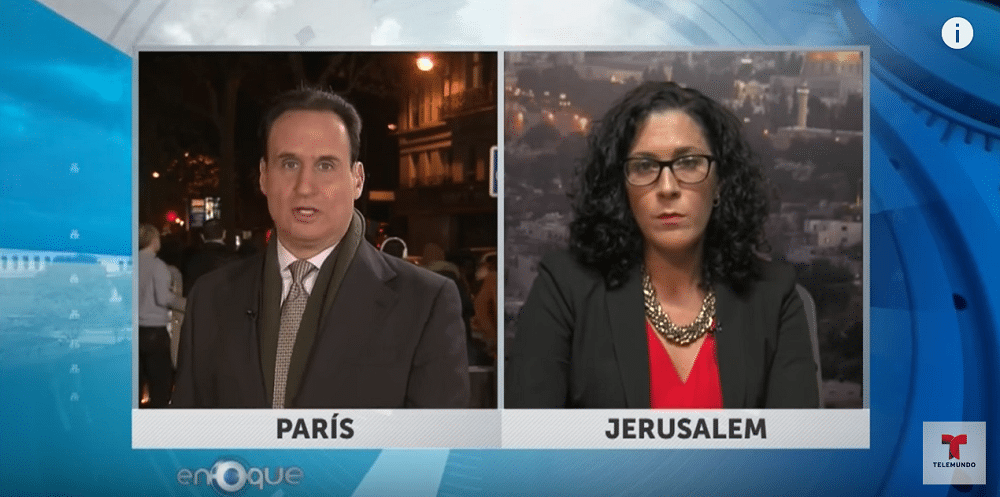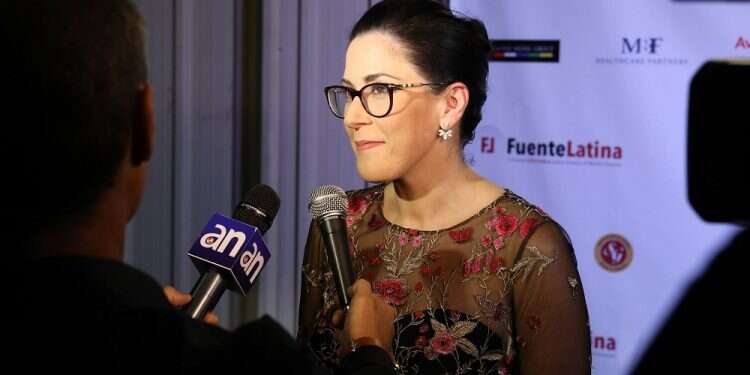Most Israelis have never heard of Fuente Latina, but for Spanish-speaking news consumers, it is nothing short of a media powerhouse, especially with respect to information and news coverage regarding Israel and the Middle East.
Established in December 2012, Fuente Latina is the brainchild of Leah Soibel, an expert on the region who is often called upon when Spanish-language media covers stories about Israel and the Middle East.
Follow Israel Hayom on Facebook and Twitter
Soibel founded Fuente Latina as a non-profit, nongovernmental organization with the aim of filling what she saw as a void in the Hispanic media market.
As it turns out, she was right. With headquarters currently in Miami and offices in Madrid and Jerusalem, it has become an invaluable source of information for thousands of Latino journalists and top Spanish-language media outlets, including Argentina's Infobae and Perfil, the US-based Telemundo, Univisión and El Nuevo Herald, and Colombia's El Espectador, to name a few.
With more than half a billion Spanish-language news consumers worldwide, and with Hispanics being the fastest-growing minority in the US, Soibel maintains that media matters more than ever.
"There are so many inspiring stories about Israel," she said in a special interview with Israel Hayom. "Our goal is to help the global Hispanic media tell those stories that culturally matter most to their audiences in real-time."
Fuente Latina's mission, she said, is one "of passion and pursuit for truth. For our staff, Fuente Latina's work is a labor of love. We work around the clock to ensure that global Spanish-language media have the facts they need – before and when the news breaks – to accurately cover Israel and the Jewish world, regardless of their geographic location."
Bringing down barriers
Soibel, a Hispanic American and Israeli, knows what she's talking about: She earned her B.A. in Middle East History from Dickinson College and holds a Master's Degree in Security Policy Studies from George Washington University. She is a National Security Education Program Fellow, who also received an Arabic-language certificate from the American University of Cairo's Arabic Language Institute.
These have made her a regular contributor to influential Hispanic media outlets such as Infobae, El Nuevo Herald, Univisión, El Diario de Nueva York, and La Opinión de Los Ángeles, among others.
It was in her frequent dealing with the Hispanic media, in the ever-hectic news cycle, that she found that what was missing: A credible source of information to counter the clutter of voices trying to delegitimize and at the time demonize, the Jewish state.

"Our mission is to break down geographical, cultural, and linguistic barriers for Spanish-speaking media covering Israel, the Jewish world, and the Middle East," Soibel explained.
"The journalists and influencers are the true storytellers. We empower them by providing them with accurate information, access to newsmakers, high-quality digital content, and any other tools that they need to tell Israel's story."
Q: What drove you to establish this type of organization?
"Two main factors: A passion for Israel and a need to fill a void in the Hispanic media market.
"By 2012, the phrase 'Hispanic vote' had become a common American buzzword. Hezbollah, Hamas, and Iran were communicating in Spanish to millions of Hispanics around the world, and Spanish-language media interest in the Middle East was growing due to the Arab spring.
"I had been working on the front lines of Israel's information war since 2005, engaging thousands of foreign journalists from all over the world. But once back home, these journalists lacked access to experts and real-time information to tell Israel's story accurately from afar.
"As more and more Hispanic media professionals and opinion leaders visited Israel, the demand for access to factual information rapidly grew. I realized that there was a void in the market and I wanted to be the one to fill it. That is what drove me to establish Fuente Latina."
Israel is often maligned by the global media, where countries' underlying – and sometimes unambiguous – anti-Semitic sentiments often color the coverage of Israeli and Jewish issues as a whole.
All too aware of this issue, Soibel said her organization seeks to fight such phenomena "by proactively providing global Hispanic media with the facts they need to cover stories accurately regardless of their geographic location– whether in Madrid or Miami – we succeed in reducing negative coverage."
"This model has proven successful. The current pandemic is a good example. Most journalists are now forced to report from their living rooms rather than the field. Fuente Latina provides quality video and written content about Israel's fight against COVID-19, which is aired by hundreds of global Hispanic media outlets, reaching millions of Spanish speakers worldwide with positive coverage about Israel's efforts to combat the virus.
"We are unique in that we serve thousands of Hispanic journalists covering Israel from abroad, tailoring information for their specific target audience," she continued. "Fuente Latina is a non-profit media organization, not a news agency. Therefore, our role is more strategic and cost-effective.
"Rather than relying on news wire stories, we offer global Hispanic media an alternative source for covering Israel in their language and in real-time. In doing so, we have evolved into one of the most trusted sources for Spanish-language media covering Israel and the Middle East."
'Iran is doing an excellent job spreading its messages of hate'
The fast-paced information arena of the digital age, endlessly fueled by mainstream reports and social media posts that often enjoy similar credibility, has proven a hotbed of fake news, propaganda, and incitement, requiring Israel to kick its public diplomacy efforts into high gear.

Here, too, the Jewish state often comes across delegitimization efforts by Iran, among others, and the propaganda machine driven by the Islamic republic is not oblivious to the ever-expanding presence of Hispanic audiences.
Given their considerable religious, cultural, and demographic differences, Iran and the Latin American nations may appear to be unlikely allies, but that is not the case.
Stifled by the US sanctions imposed over its nuclear efforts, Tehran has been reaching out to Latin American countries and has been able to forge solid economic relations with Brazil and Bolivia, and it maintains particularly warm ties with Argentina and Venezuela.
But Fuente Latina seeks to combat Iranian disinformation campaigns among Spanish-speaking audiences.
"I established Fuente Latina from the tiny kitchen of my apartment in Jerusalem. Unbeknownst to me, at the same time, Tehran launched a multimillion-dollar, 24/7 international TV news network with correspondents throughout the Spanish-speaking and the U.S. in order to win Hispanic hearts and minds in favor of Iran and against Israel and the United States," Soibel recalled.
"Unlike Iran, Israel doesn't have its own 24/7 international Spanish-language TV news network. Countering Iranian and other extremists' misinformation campaigns by facilitating accurate content and news reports is just another day at the office for us."
Q: Much of Iran's efforts in the global media are focused on denying Israel's right to exist. Do you think this type of propaganda has taken hold among Spanish-speaking audiences? In your opinion, does it play a major role in the rise of anti-Semitism among Spanish-speaking communities and countries?
"Iran is doing an excellent job spreading its messages of hate across the Spanish-speaking world with the intention of swaying public opinion against Israel and America.
"When Iran's Spanish-language network, HispanTV, airs slanderous stories about Israel like alleging that IDF soldiers harvest Palestinian organs or that Israel is behind the coronavirus, they do so with one purpose in mind – to fuel anti-Israel sentiments in the Hispanic world."
Fuente Latina, she continued, "Strives every day to counter this propaganda and encourage Spanish-language media outlets to use our materials instead. Fuente Latina ensures that global Hispanic media have accurate information they need to tell stories that are important to their readers that reflect the truth about Israel and the Jewish world."

Q: How do you see your organization's role in fighting anti-Semitism and the BDS movement, now and in the future?
"Negative images and misinformation about Israel and Jews in the press and on social media is directly linked to anti-Semitism and BDS. Fuente Latina fights that type of hate and bigotry every day by facilitating accurate news stories about Israel and the Jewish people while at the same time countering fake news."
Q: You were recently quoted as saying that the global Hispanic media market could be a "game-changer" for Israel.
"There are an estimated 500 million Spanish-speakers worldwide and millions of Hispanics are leaving Catholicism to become protestant evangelicals, a demographic that are strong supporters of Israel," Soibel explained.
"In addition to the mainstream Spanish-language media, there is a growing Hispanic Christian media market, which we are engaging through our work. It's a huge audience with ever-increasing influence in the US and around the world. In Latin America, Christians are having a profound impact on perceptions and policies that favor Israel. A lot of education and engagement needs to take place, but Hispanics by-and-large are natural allies with shared values that genuinely care about Israel and Jewish people.
"In my opinion, the most important aspect of engaging Hispanics is their willingness to listen and learn. Once provided with accurate information that is tailored to what matters most to their community, they want to know more. This is why the media is so important and where Fuente Latina is focusing its efforts."
Q: Does Fuente Latina maintain partnerships with Israeli organizations, ministries, and media outlets?
"Yes, we partner with several Israeli and Jewish organizations in Israel and across the Spanish-speaking world but our primary relationships are in the non-Jewish Hispanic arena," she said.
"This year, we started a new program to engage US progressive Latino influencers and Hispanic student journalists. Unfortunately, the pandemic has temporarily put these programs on hold."
But that's not all. According to Soible, her organization also offers Hispanic media professionals a media fellowship in Israel.
"The Fellowship provides a unique opportunity to experience international reporting and earn bylines from one of the most exciting and intriguing news hotspots in the world.
"Media fellows are expected to make the most of this professional experience by publishing at least two stories of their choice during the trip or immediately upon their return. More than 300 journalists from the US, Latin America, and Spain have participated in the Fuente Latina Media Fellowship since 2013. Some of our fellows have called the experience 'eye-opening' and 'life-changing,'" she said.
Q: You split your time between Israel and the United States. How would you describe your connection to Israel?
"Wherever I am in the world, Jerusalem will forever be my home."




